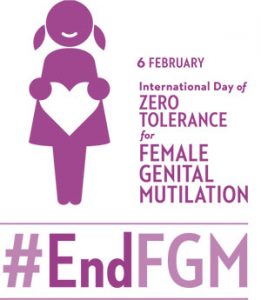
On this day, let us commit to intensifying global action against this heinous human rights violation for the sake of all affected women and girls’
– UN Secretary-General António Guterres, International Day of Zero Tolerance for Female Genital Mutilation, 6 February
This week on 6th February, the UN observed the International Day for Zero Tolerance for Female Genital Mutilation with the 2017 theme, Building a solid and interactive bridge between Africa and the world to accelerate ending FGM by 2030.
Female genital mutilation (FGM) comprises all procedures that involve altering or injuring the female genitalia for non-medical reasons and is recognised internationally as a violation of the human rights of girls and women. It is estimated that globally, at least 200 million women and girls have undergone some form of FGM with girls under 14 representing 44 million of those who have been cut.
While primarily concentrated in 29 countries in Africa and the Middle East, FGM is a global problem and practiced in some countries in Asia and Latin America.
The United Nations Population Fund (UNFPA) together with UNICEF have jointly led a global programme, Accelerating Change, to accelerate the abandonment of this practice and partners local community organisations with scientific research. Their focus is to protect women and girls using a culturally sensitive approach.
The programme, now operating in 17 countries, works closely with member states to foster greater understanding of FGM.
Key Facts:
- Globally, it is estimated that at least 200 million girls and women alive today have undergone some form of FGM.
- Girls 14 and younger represent 44 million of those who have been cut, with the highest prevalence of FGM among this age in Gambia at 56 per cent, Mauritania 54 per cent and Indonesia where around half of girls aged 11 and younger have undergone the practice.
- Countries with the highest prevalence among girls and women aged 15 to 49 are Somalia 98 per cent, Guinea 97 per cent and Djibouti 93 per cent.
- FGM is mostly carried out on young girls sometime between infancy and age 15.
- FGM cause severe bleeding and health issues including cysts, infections, infertility as well as complications in childbirth increased risk of newborn deaths.
- FGM is a violation of the human rights of girls and women.
- The Sustainable Development Goals in 2015 calls for an end to FGM by 2030 under Goal 5 on Gender Equality; Target 5.3: Eliminate all harmful practices, such as child, early and forced marriage and female genital mutilation.
- The elimination of FGM has been called for by numerous inter-governmental organisations, including the African Union, the European Union and the Organization of Islamic Cooperation, as well as in three resolutions of the United Nations General Assembly.